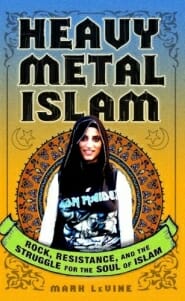
A journalist proves his metal in the Muslim world
It’s inconvenient but true that people, societies and religious systems are often more complex than we want to believe. Take Islam, for instance. In today’s America, we’re likely to presume that the violence and oppression we’re told represents Islam is the entire story of the world’s 1.25 billion Muslims. Many of us fail to consider that what we know of Islam is narrow and unnuanced—and that many Muslims struggle daily with the very extremism we fear. Plus, some of them really just want to headbang.
Heavy Metal Islam is precisely what its title suggests: A turning-inside-out of conventional wisdom—by way of some really loud guitars—in an effort to get beyond Western stereotypes and perceptions.
Metalhead and history professor Mark LeVine knows there’s a lot more going on in the Muslim world than most of us realize (see his earlier book: Why They Don’t Hate Us). Heavy Metal Islam emerged from years of LeVine’s travel across the Middle East and North Africa, headbanging and talking with members of one of the least-known subcultures in the region. LeVine chronicles and partakes, reflecting on and helping shape the reality he discovers. He produces a deeply felt, informed volume that’s both hopeful and emotionally honest.
“The mullahs celebrate violence,” LeVine writes of Iran, “the metalheads critique it. Being a metal fan offers—however paradoxical it might seem—a ‘community of life’… against the community of death and martyrdom propagated by the Iranian government.” Or, as Moroccan metal giant Reda Zine tells him: “We play heavy metal, because our lives are heavy metal.”
From Morocco to Pakistan, LeVine encounters a huge range of cultures and traditions—and covers a lot more than metal. We meet Palestinian-Israeli group DAM; Israeli death-doom metalists Orphaned Land (actually highly regarded among Arab metalheads); U2-approved Pakistani Sufi rockers Junoon; and Lebanese trip-hop duo Soap Kills. LeVine’s interlocutors sing, rap and growl in Urdu, Arabic, Berber, English and Hebrew; they’re members of a movement spanning thousands of miles, and yet many live sharply limited lives, often risking arrest or even torture by going to a show. In fact, in some places, “going to a show” isn’t even an option and YouTube replaces fan/artist interaction.
It’s an enormous amount of ground to cover, but LeVine does a remarkable job, sketching not only the surprising realities of the musicians, but also providing excellent historical background and terrific detail, from the eight herbs in the Iranian condiment sabzi to the claustrophobia of getting to a Palestinian Jerusalem home through four Israeli roadblocks and one 25-foot wall. And he does this all while managing the oft-forgotten trick of writing well.
LeVine is himself a Jewish-American and lived for some time in Israel. While there, he performed regularly with Palestinian oud player Ghidian Qaymari and Israeli musician Sara Alexander: “It was the combination of Sara’s acoustic guitar, accordion and gypsy-Middle Eastern melodies with my distorted guitars and Ghidian’s oud, that inspired the journey that has produced this book,” he writes.
Unsurprisingly, LeVine’s vision goes well beyond musical cooperation. “The first political statement that I made was to get a rock band together,” Junoon lead singer Ali Azmat tells him, and this sentiment echoes across the pages. For each artist, music is a light in the darkness of enormous pain and great loss, from the iron fist of dictatorships to the carnage of Israeli-Palestinian violence. Artists have devoted themselves “to creating an alternative system that builds an open and democratic culture from the ground up.”
LeVine suggests that if these artists can bridge gaps with the working class and progressive Islamists, they may trigger desperately needed change—though he’s smart enough to admit that it’s a pretty sizeable ‘if.’ Inevitably, some will dismiss LeVine as naive, but faith in our better angels is often dismissed.
There are absent stories that would’ve made the book even stronger. Perhaps inevitably, much of the Muslim world is left out (from its largest nation, Indonesia, to America’s own Islamic community), and as an American-Israeli Jew, I was disappointed that LeVine barely addresses his own Judaism, or the path that brought him to Ghidian Qaymari. Still, anyone—regardless of musical preference—who wants an eye-level glimpse into the Middle East should pick up Heavy Metal Islam. Headbanging optional.